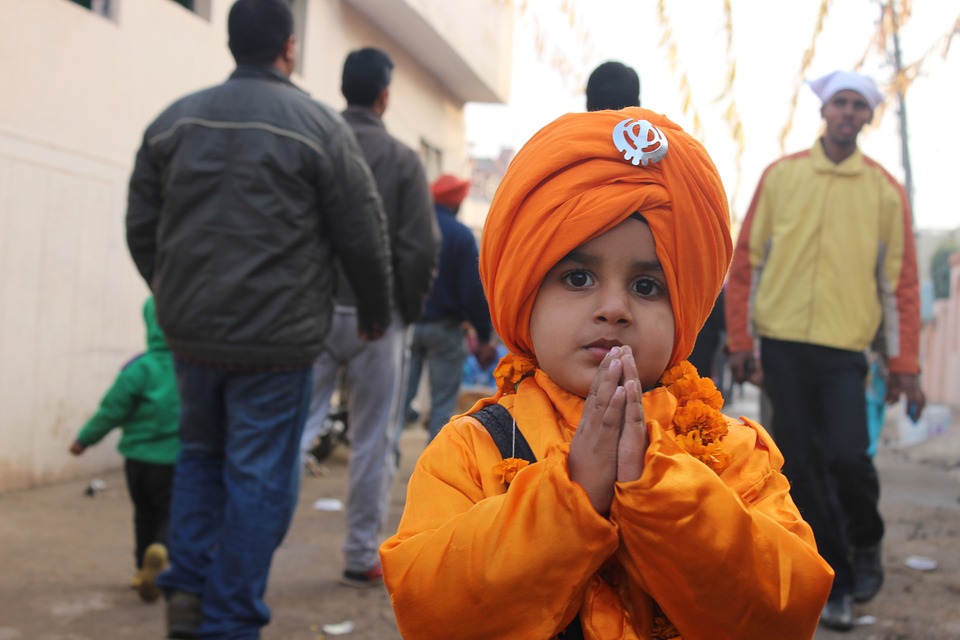“Of all the religions, the best religion is to repeat God’s name and to do pious deeds.”
– Sri Guru Arjan Dev Ji Maharaaj
Let’s learn more about the religion which started some 500 years ago!
Sikhism
Sikhism is a monotheistic religion and philosophy that originated in Punjab during the late 15th century. As one of the most recent of the major world religions, 30 million Sikhs adhere to the faith also called Gurmat, which translates to “Way of the Guru.”
Sikhism was founded by Guru Nanak, also called Baba Nanak, who was the first of the ten Sikh gurus. All the 10 Sikh gurus were believed to inhabit by a single and sacred spirit and were considered the religion’s spiritual masters. Sikhism is completely based on their spiritual teachings and the following list describes some of their teachings:
- There is only one God, without form or gender.
- Everyone is equal and has direct access to God.
- Empty religious rituals and superstitions have no value.
- If a person wants to have a good life on earth, they should do good deeds and worship God as well.
- Through Mukti, which is a concept of spiritual liberation, people will be able to understand better and become one with God.
Despite the death of the last guru, Guru Gobind Singh, the divine spirit transferred itself to the central religious scripture of Sikhism called Guru Granth Sahib.
Sikhism Rules and Regulations

The followers of Sikhism have specific guidelines that they must adhere to. Below you will find the code of conduct of Sikhism:
The Virtues of Sikhism:
- Regardless of rank, class, gender, caste or colour, you should always respect every individual.
- It is essential to share your possessions and even your knowledge with those in need.
- Altruism refers to a practice when you show genuine concern for others’ welfare and according to Sikhism, it is crucial to become an altruistic person.
- One should earn an income only through hard work and honest employment.
- Sikhs are always expected to support and defend the oppressed ones.
- Sikhs do not have the right to trim or shave their hair.
- Daily prayers and meditation are strongly recommended.
- We should be able to recognise the divine light present in all things.
- Treat any other person as you would with your own family member.
- Follow the steps of the ten gurus
Now, are there certain things that the Sikhs are prohibited from doing?
Prohibitions in Sikhism:
- Intoxication: The consumption of alcohol, drugs and tobacco is strongly prohibited in Sikhism.
- Gambling: Whether it is the lottery, roulette, poker, American bingo or British bingo, gambling is forbidden for any Sikhs.
- Material Obsession: Sikhs are not allowed to be obsessed or attached with any worldly possessions.
- Blind spirituality: Superstitions such as knocking on wood or tossing spilt salt over the shoulder should not be practised. Moreover, one should avoid worshipping idols and observing rituals like ritual purification, circumcision, grave worship and many more.
- Sacrifice of creatures: Sati refers to an ancient Hindu practice where a widow would normally sacrifice herself by sitting on top of her deceased husband’s funeral pyre. This practise was common in ancient Hindu Rajput clans and some isolated cases were even reported in the 20th century. However, as per the rules of Sikhism, this and animal sacrifices during the celebration of holy occasions are strictly forbidden.
- Extramarital Sexual Relations: Adultery is prohibited and Sikhs are not allowed to cheat on their spouses.
- Useless Talk: Gossip, lying, bragging and backbiting are not allowed in Sikhism. It is stated in the Guru Granth Sahib, that “if, as a Sikh, your mouth has not stopped slandering and gossiping about others, then your service is useless and fruitless.”
- Eating meat: There are even some eating prohibitions. For instance, kutha meat refers to that meat that was obtained through religious sacrifice such as halal and Sikhs are not allowed to eat such meat.
Compared to the other religious laws, what do you think about Sikhism? Please share your comments!

